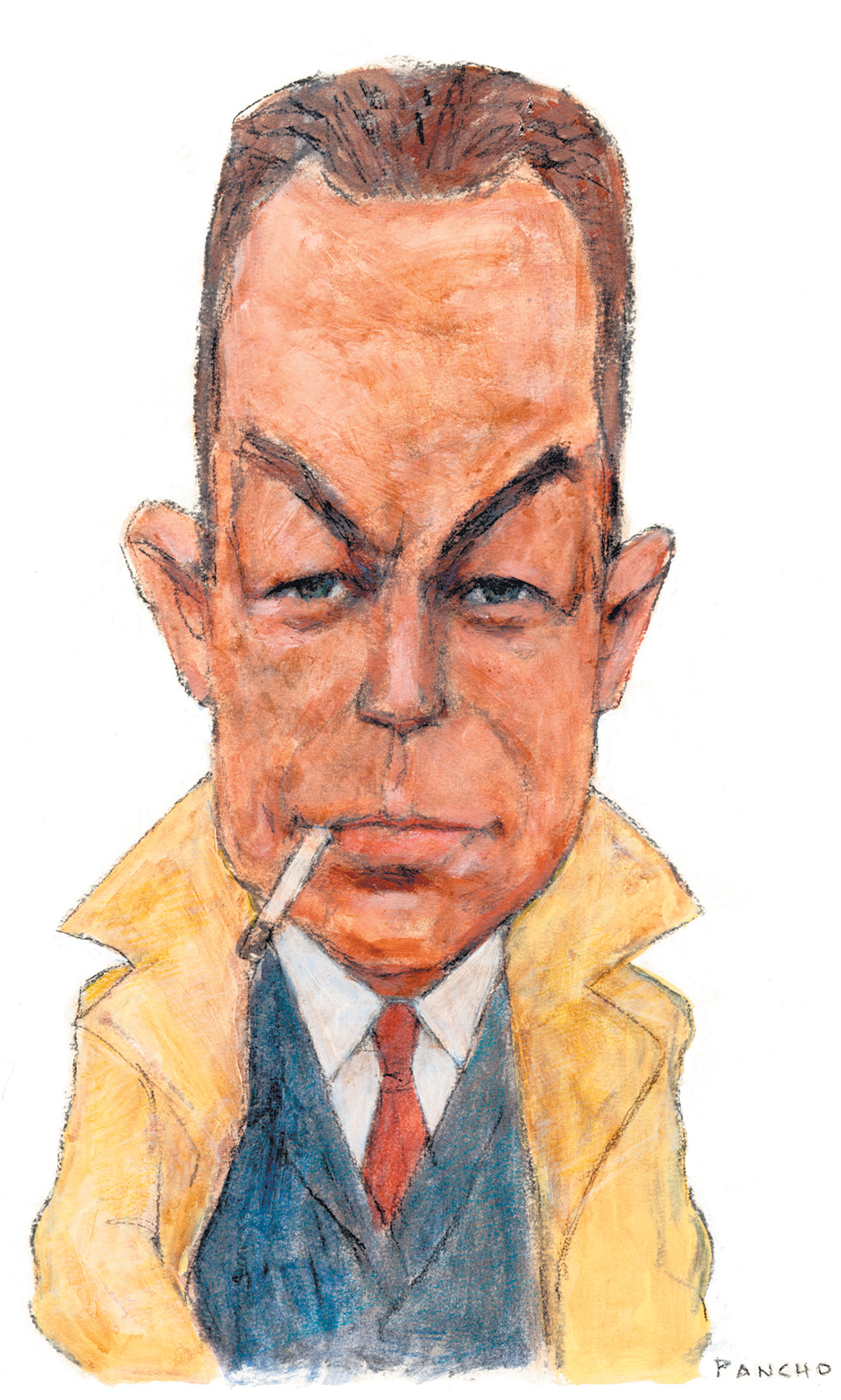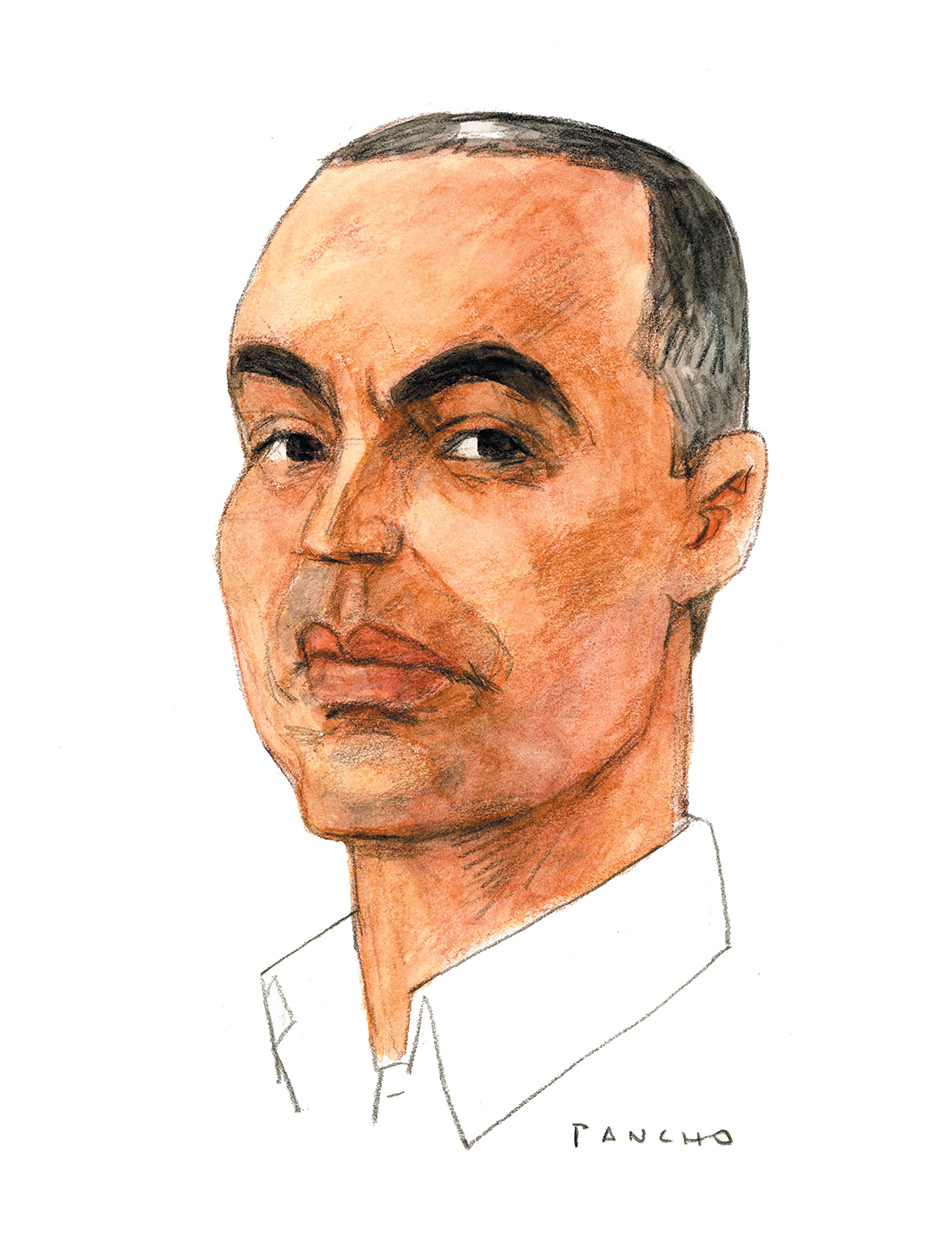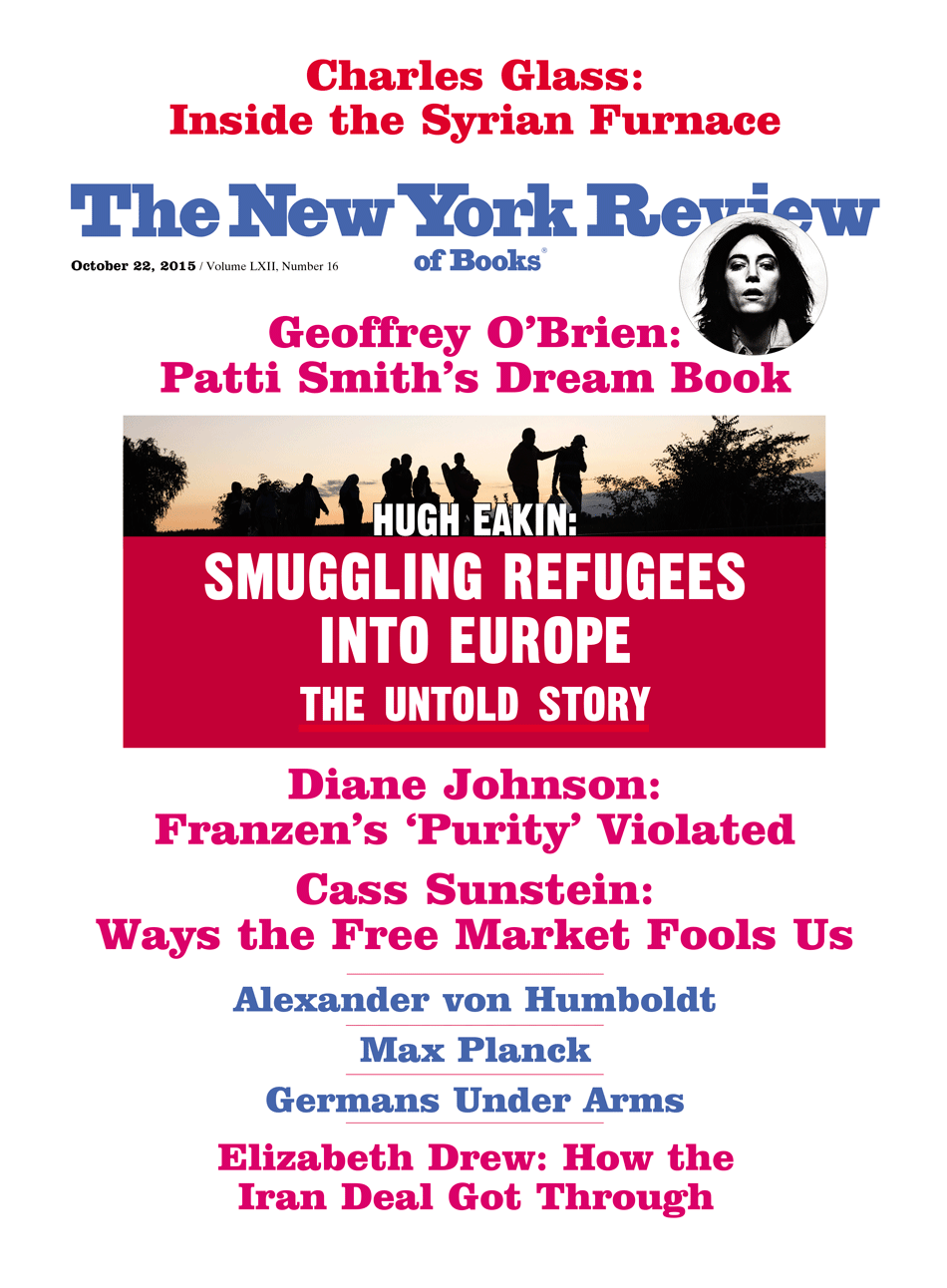Kamel Daoud’s novel The Meursault Investigation may have attracted more international attention than any other debut in recent years. The Algerian writer’s book, first published in French in Algeria in 2013, then in France in 2014 (where it won the Goncourt First Novel Prize and was runner-up for the Prix Goncourt itself), then admirably translated into English by John Cullen and published here in the late spring, has been widely acclaimed in France, North America, and the UK as an “instant classic” (to cite The Guardian).
Daoud is an influential and controversial journalist who writes for Le Quotidien d’Oran, in the city on Algeria’s Mediterranean coast where he lives. Since last December he has been under a fatwa declared, on Facebook, by the Salafist cleric Abdelfatah Hamadache. This followed an interview on French television in which Daoud criticized Muslim orthodoxy and said that he considered himself Algerian rather than Arab.* Azadeh Moaveni, writing for the Financial Times, called Daoud’s book “perhaps the most important novel to emerge out of the Middle East in recent memory.”
The Meursault Investigation—called in French Meursault, contre-enquête, or counter-investigation—is a response to Albert Camus’s The Stranger. Narrated by an aging drinker named Harun, the account conflates Meursault and his creator and presents the infamous fictional murder of “the Arab” on a sun-drenched beach as if it were a real crime worthy of a police inquiry. Harun’s aim is to tell the “true” circumstances of that story and its legacy, from his own perspective. In Camus’s book, he points out, “the word ‘Arab’ appears twenty-five times, but not a single name, not once.” Harun wants his listener to understand that the dead man had a name and a family, neither of which figure in Camus’s novel. “Just think, we’re talking about one of the most read books in the world,” he muses. “My brother might have been famous if your author had merely deigned to give him a name.”
Meursault’s victim was in fact, Harun explains, his older brother Musa (Moses). Harun himself was only seven at the time of the crime (in 1942), and recalls that “everything revolved around Musa, and Musa revolved around our father, whom I never knew and who left me nothing but our family name.” As a result of the tragedy, his mother “imposed on me a strict duty of reincarnation”; serving the memory of his lost brother and his mother’s need to preserve it, he writes that he “had a ghost’s childhood.”
The novel is the poignant account of a man whose life has been warped, from the beginning, by his mother’s legacy of rage and grief. This is a familiar theme of postcolonial literature and one that Daoud will shape into a critique of revolutionary and postrevolutionary Algeria, a country that, in Harun’s view, is not much better off than in its previous incarnation. Harun, sitting on a barstool and chatting with a foreigner, speaks openly about Algeria, his brother, and his own life story. His secularist, sophisticated reflections would seem to echo those of his creator. Daoud’s complex and thoughtful analysis is inescapably tied to the thought and work of his French colonial predecessor—also a controversial journalist, whose youthful work forced him into exile in France.
From Daoud’s first sentence—“Mama’s still alive today”—the novel is a dialogue with Camus; the first sentence of The Stranger is “Aujourd’hui, maman est morte.” But Daoud, who is both erudite and playful in spirit, samples and riffs upon not only Camus’s most celebrated novel but on his entire work and his life. Unburdening himself over several nights to his unnamed interlocutor at a bar, Harun recalls Jean-Baptiste Clamence, the protagonist of The Fall; he laments “the absurdity of my condition, which consisted in pushing a corpse to the top of a hill before it rolled back down, endlessly,” a reference to Camus’s philosophical essay, The Myth of Sisyphus. Even Harun’s fatherless childhood in Algiers echoes that of Camus, who had no memories of his father, killed in the first days of World War I when Camus was an infant.
But the novel engages primarily with The Stranger, the outlines of which define Harun’s story. Not only is Musa Meursault’s victim; Harun himself, like Meursault, has a murder to deal with, as well as a difficult mother and a firm hostility to organized religion. Harun’s childhood was shaped by his mother’s mythmaking about her lost elder son:
She wouldn’t describe a murder and a death, she’d evoke a fantastic transformation, one that turned a simple young man from the poorer quarters of Algiers into an invincible, long-awaited hero, a kind of savior.
She was, as Harun puts it, a peasant “snatched away from her tribe, given in marriage to a husband who didn’t know her and hastened to get away from her.” She inhabited a different world from that of the French colonials who ruled Algeria or of the Algerian government that has followed: “I don’t know my mother’s age, just as she has no idea how old I am. Before Independence, people did without exact dates; the rhythms of life were marked by births, epidemics, food shortages, et cetera.” The cultural gulf between Harun’s mother’s perspective, based on myths, and the Western views of Meursault/Camus is vast, reminiscent of the gulf between Petrus, a black, polygamous South African farmer, and the white Lurie family in J.M. Coetzee’s Disgrace. In Coetzee’s book, as in Daoud’s, this separation results in a violent act that casts doubt on the new order.
Advertisement
Harun serves as a bridge between two mutually uncomprehending societies—“that’s the reason why I’ve learned to speak this language [that is, French], and to write it too: so I can speak in the place of a dead man, so I can finish his sentences for him,” he explains at the outset—and herein lies his importance.
In a telling passage, Harun reflects more expansively on the difference between the world of his childhood and what came later, claiming that his mother’s dramatic grief
pushed me to learn a language that could serve as a barrier between her frenzies and me. Yes, the language. The one I read, the one I speak today, the one that’s not hers. Hers is rich, full of imagery, vitality, sudden jolts, and improvisations, but not too big on precision. Mama’s grief lasted so long that she needed a new idiom to express it in. In her language, she spoke like a prophetess, recruited extemporaneous mourners, and cried out against the double outrage that consumed her life: a husband swallowed up by air, a son by water. I had to learn a language other than that one. To survive. And it was the one I’m speaking at this moment…. Books and your hero’s language gradually enabled me to name things differently and to organize the world with my own words.
More than that, Harun will explain that Meursault’s story was first brought to him by a young woman, a scholar named Meriem, who traced “the Arab’s” origins to Harun and his mother, both of them then living in the village of Hadjout, formerly Marengo. “I was held as if spellbound. At one and the same time, I felt insulted and revealed to myself…. It was like reading a book written by God himself.”
The genius and the limitation of Daoud’s novel lie in the directness of this engagement with Meursault/Camus. It’s not hard to grasp why a fiction that so deliberately and so intimately binds itself to Camus’s classic should excite attention and admiration from Western readers. As Nick Fraser wrote in The Guardian, Daoud “has created the ultimate Camus mixtape.” Harun expresses equal parts awe and frustration at Meursault/Camus (“a book written by God himself”). Camus’s admirers, then, in identifying with Harun’s admiration, are also more able to understand his dismay.
Daoud, for his part, takes the opportunity to criticize the postcolonial Algeria from which Harun finds himself increasingly alienated. During the first days after liberation, Harun murders a Frenchman (again in a direct echo of Meursault; although the Frenchman is, importantly, granted a name: Joseph Larquais). Harun’s interrogation by the police is as farcical as was Meursault’s. Whereas Meursault was convicted because he didn’t behave like a loving son, Harun is criticized because his timing was off: “This Frenchman, you should have killed him with us, during the war, not last week!” the local colonel explains. Still, Harun says, “At the time when I did that killing, God wasn’t as alive and heavy in this country as he is today.”
Fifty years later, Harun is saddened at the disappearance of women like Meriem (“free, brash, disobedient, aware of their body as a gift, not as a sin or a shame”), and ruefully amused that producing wine—let alone drinking it—is now “considered haram, illicit.” Above all, he is profoundly affronted by the dominance of religion in Algeria, horrified by a neighbor who recites from the Koran all night long: “As far as I’m concerned, religion is public transportation I never use,” he quips. “I alone pay the electrical bill, I alone will be eaten by worms in the end. So get lost! And therefore I detest religions and submission.” And further, “I’ll go so far as to say I abhor religions. All of them! Because they falsify the weight of the world.”
Advertisement
As Moaveni observes in the Financial Times, “Harun represents the alienation of millions of Arabs struggling to occupy that secular middle ground in their societies, struggling to live among their neighbors in peace and write in safety.” Daoud is giving literary voice, in a language intelligible to the West—both literally, in French, and also within a familiar philosophical tradition—to a point of view that the West longs to hear but that tends to be drowned out by other voices from the Middle East. It’s a perspective that Daoud articulates also in his journalism, putting himself at considerable risk while doing so. One of his newspaper columns from Le Quotidien d’Oran, entitled “Meursault,” was translated for the online magazine Guernica:
Try to remember the last time there was anything like a national will: twenty years ago. Since then some people have died, others can’t manage to be born, and still others have that faraway look in their eye. In short, we’re all just spectators, like when you see people quarreling in a train station, but you’re worrying about your luggage, your sandwich or your ticket. This feeling is universal with us now: the campaign for reform finally breaks down into an individual struggle to get by. Our country is no longer a project we all share, it’s an obstacle each of us confronts alone.
This insight reverberates in many ways: most simply, it suggests—originally to Algerians themselves, and more broadly to readers outside his country—why Algeria took no more than a small part in the Arab Spring. But it also illuminates the psychological state that keeps the silent millions to whom Moaveni refers from speaking out. It suggests why Harun would need to be half-drunk in a bar in order to confess his thoughts to an outsider. This insight expresses an increasingly widespread state of affairs: in the US as much as in Daoud’s country, we stand by apparently inured to mass shootings, widespread surveillance, and unchecked police brutality, instead worrying, as it were, about our luggage and our sandwiches.
Daoud is bold to explore, in journalism and in fiction, the true complexity of the Algerian experience as he and others see it. Roger Cohen, in an Op-Ed in The New York Times, celebrates the similarities between Daoud and Camus:
There is more that binds their protagonists than separates them—a shared loathing of hypocrisy, shallowness, simplification and falsification. Each, from his different perspective, renders the world visible—the only path to understanding for Arab and Jew, for American and Iranian, for all the world’s “strangers” unseen by each other.
Daoud’s voice is particularly telling for its subtlety and tolerance. He sees Camus more clearly than do many of his enthusiastic European and North American critics, and appreciates the irony that “The Stranger is a philosophical novel, but we’re incapable of reading it as anything other than a colonial novel.” Describing his Meursault project he says: “I’m not responding to Camus—I’m finding my own path through Camus.”
[Camus] was an Algerian writer. My own “Algerianess” is not exclusive and does not exclude others: I assume everything that enriches me, including the monstrous wound of colonization. Camus is Algerian because Algeria is larger and older than French Algeria, Ottoman Algeria, Spanish or Arab Algeria.
Daoud neither rejects Camus and his colonial legacy outright nor accepts his work uncritically. His resulting meditations are rich and thought-provoking, both for Algerian and for Western readers. He lets no one off the hook, including Harun himself. The claims for the novel’s international importance are, in this sense, well founded. That said, the book cannot be read meaningfully without The Stranger behind it: for all its vitality, the novel’s skeleton is Camus’s. Harun’s actions and meditations exist in counterpoint to Meursault’s.
This puts Daoud, ironically, in an irretrievably postcolonial position—always in response, always post facto—that is both philosophically and literarily discomfiting. Yet it enables North American readers as much as French ones to enter, using Camus’s fiction as a filter or funnel for Daoud’s, into a contemporary Algeria otherwise largely inaccessible to outsiders.
Daoud has cited The Fall, rather than The Stranger, as his favorite Camus novel, lauding it as “a literary, philosophical, and religious exercise all at once.” In Europe and North America at least, The Fall is now much less widely read than most of Camus’s work, and its form—the narrated confession—can seem didactic and often abstract. It has precisely the effect of an exercise, to use Daoud’s word. More than The Stranger or The Plague, The Fall now feels dated. The self-accusing monologues of the former Parisian lawyer who ends up in Amsterdam raise issues that are still germane; its literary form is less convincing. Indeed, one could argue that the force of Camus’s fiction (unlike that of, say, Balzac or Proust or Marguerite Duras) is tied to his philosophical essays; that the sum of his works amounts to more than themselves.
By the same token, The Meursault Investigation, fascinating and important as it is, is not of itself an especially interesting work of art. Cleaving as it does to the substance of The Stranger, taking The Fall as a literary model, it too has the quality of an intellectual exercise—albeit one expertly executed and replete with significance; one that should, even must, be read for its fierce and humane intelligence.
Like Camus before him Daoud is an intellectual, deploying the novel for philosophical and political purposes. His voice and his presence are what many—in Algeria, in Europe, and around the world—have been yearning for. He dares to speak his mind, and is keen to speak in such a way that strangers—in this case, most of his readers—can understand him. In order to assert this freedom, he is prepared to risk his life. As he has said:
The intellectual is the unbending witness to his era, one that leads to liberty or surrender. He’s the voice that carries and proclaims, but also reminds. In the face of the rising totalitarianisms of our new century, it is a question of witnessing on behalf of what is human, on behalf of humanity, but especially on behalf of liberty—its value and necessity.
-
*
For an excellent commentary on Daoud’s political ideas and his journalism, see “Stranger Still,” Adam Shatz’s profile in The New York Times Magazine, April 1, 2015. ↩




